Coronavirus: 'What life without a leisure centre means for us'
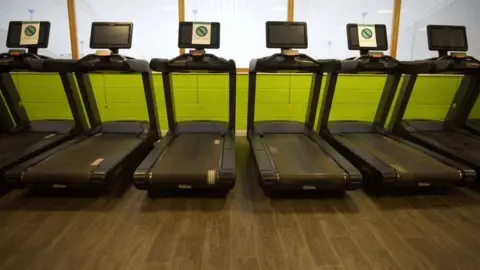 BBC
BBCWith councils facing huge financial pressure due to the impact of Covid-19, the uncertainty over when leisure centres can reopen has caused further budget headaches. BBC News visited one on the Essex coast to see what the impact was there.
A familiar face around Clacton Leisure Centre over the past three years has been Jo Williamson.
She usually attends up to five times a week, but her routine has been shifted out of joint since it closed in March.
The 39-year-old says going to the centre gives "you a little bit of a sense of purpose - that's your little outlet, that's what you enjoy doing".
"By not having that you're a bit like 'well, now what do I do?'. There's lot of people that go for a jog down the seafront or go for a bike ride and things like that, but it's not quite the same."
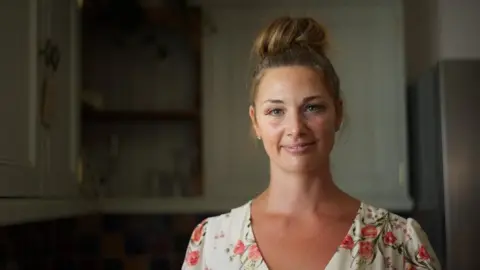
The centre is one of six leisure centres owned by Tendring District Council, which closed all of those facilities in late-March on government guidance.
Clacton, with a population of more than 50,000, is a popular haunt for those seeking sun by the sea.
Despite the current high temperatures and the appeal of the nearby coastline for exercise, people still appear in need to know when they can get back to their old habits.
"I've just had a man out here who's walked past me and said he's desperate to get back here and had come to find out when it was opening," says councillor Alex Porter, at the leisure centre.

Instructors have done some virtual classes via Facebook, but as no-one has been able to use the facilities, Mr Porter said membership fees had been stopped.
The council estimates it has lost income of about £310,000 on leisure centres and sports facilities hire, but says government funding has offset this.
Gym bosses across England have said they are "extremely disappointed" at the government's decision not to reopen indoor sports facilities on 4 July.
The government hopes gyms can reopen in mid-July and Conservative councillor Mr Porter feels that at the moment "there isn't too much of an impact".
"Obviously if it went on for a very long time then that would be a problem, but at the moment it's not too bad. It's more the fact that people obviously can't use the facilities."
Some of the largest UK councils say they may have to declare themselves effectively bankrupt unless the government agrees to further support amid the impact of Covid-19.

A leisurely look at leisure centres
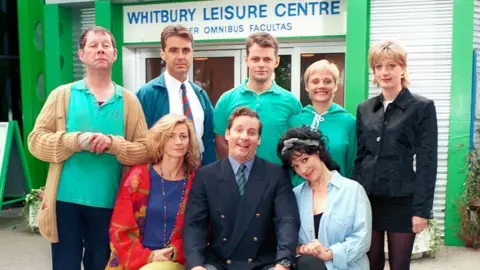
- The first leisure centres were proposed in the 1950s.
- Leisure centres are typically a combination of sports facilities, such as a swimming pool and gym.
- Popular 1990s sitcom The Brittas Empire was based at a leisure centre in Ringwood, Hampshire.
- In January, a Local Government Association investigation said nearly two-thirds of leisure centres were outdated and in need of urgent investment.

For the centre's sports facilities manager Marcus Poston it probably has not been the start to the role he envisaged.
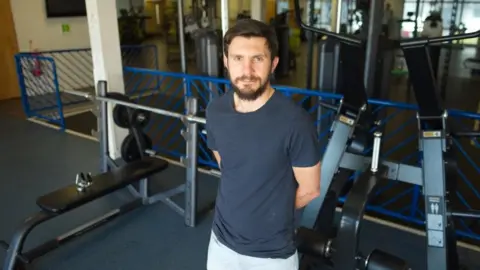
Mr Poston took up his new position in February, shortly before the birth of his daughter, and upon his return found himself dealing with coronavirus preparations.
During lockdown, plans have been put in place to create a safe space for people to come and exercise.
"It's going to be strange, it's going to be different for everybody - staff as well as customers," says Mr Poston.
Alternate treadmills have been designated for use to adhere to social distancing, showers and changing spaces have been shut and dance classes will now take place in the more spacious main hall.
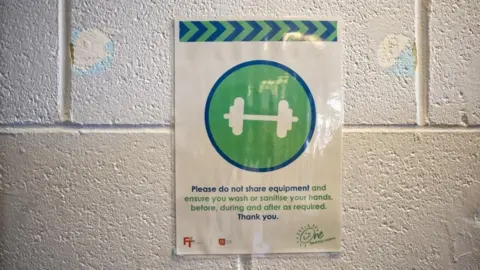
Mr Poston said there would be a phased reopening of facilities and that plans included making people use the gym and swimming pool in sessions.
"In theory we're at one-hour sessions and then you'd have a half-hour cleaning window after that to would allow people to exit and then there'll be a cleaning regime on all touch points and equipment," he says.
He says there would also be cleaning stations for customers to use, including disinfectant and hand sanitiser, and there would be a "little bit of an onus to obviously clean their own equipment as they go round".

He understands that while some customers will be "pleased with what we've done, some might be a little disgruntled, but we're only following set guidelines".
"As much as customers are new to it, staff and processes we're putting in place, we need to see how it's going to go," he says.
As for university contract manager Mrs Williamson, it seems she cannot wait for the leisure centre to reopen.
She says she felt throughout lockdown she had "become a bit lazy and a bit of a recluse" and had replaced her classes with "lots and lots of gardening".
Mrs Williamson feels the gym "really spurs you on to be healthy in general" and that "having that exercise and the social aspect is good for mental health".
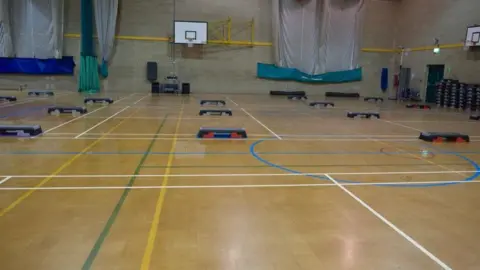
"You know on Saturday mornings that's your class, you really enjoy doing it because the music's good, the people are fun, you've got that one hour that's yours and then for the rest of the day you can do whatever you want to do.
"I'm not very good at being self-motivated so I wouldn't go out for a jog or a bike ride - I just want to go to the gym and I want them to push me and I want them to tell me what to do," she says.
